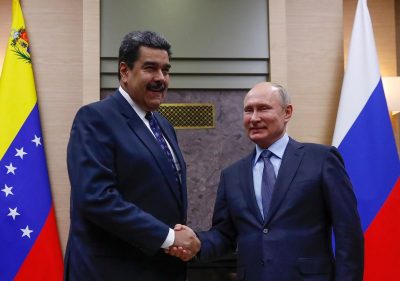Russia-Venezuela Air Travel: Latin American Is Not the US’ “Backyard”?

The Venezuelan Minister for Tourism and Foreign Trade, Felix Plasencia revealed in an interview that Russia and Venezuela are analysing the possibility of opening commercial air routes between the two countries. The minister, who last week participated in the 23rd General Assembly of the World Tourism Organization (UNWTO) in St. Petersburg, revealed that the proposed routes will not only connect Moscow and Caracas, but also St. Petersburg and other Venezuelan cities like Margarita and Barcelona.
***
The head of Venezuelan Tourism said that although there is currently a tourist flow to Venezuela from Russia, it could be much greater. He also expressed his belief “that Venezuela is an attractive destination for Russian visitors.” With Venezuela in the midst of a crushing economic crisis, perpetuated by US sanctions and economic sabotage, Russian tourists can reinvigorate Venezuela’s tourist industry. In 2018, Russian citizens made 44,551,092 trips outside the Russia, for business and leisure. Venezuela does not even feature in the Top 10 favourite travel destinations for Russians despite its tropical climate and pristine beaches, while other sun-soaked destinations occupy 9 spots.
With most of the direct benefits of opening direct travel routes between the two countries going in favour of the South American country, Russia also benefits in other ways. This demonstrates that Russia is not just interested in Venezuela for economic and geopolitical reasons, but also to create cultural exchanges while supporting an ally through soft power approaches. The cultural exchanges and soft power approach will consolidate Russia as a friend of Venezuela in the minds of the local people. This further strengthens Russia’s support for Venezuelan President Nicolás Maduro against US-backed reactionaries, and allows Russia to continue to build strong relations in a region described as “America’s Backyard.”
Russia’s plans are all the more important considering that the US Department of Transportation ordered on May 15 the suspension of all flights between their country and Venezuela due to supposed security reasons. Long-time tensions between the US and Venezuela worsened in January when opposition deputy Juan Guaidó proclaimed himself “interim president” of the country, ignoring democratically elected Maduro, and obtained the support of several anti-Bolivarian countries, like the US, Brazil and Colombia. Maduro considered that the US decision was taken “out of frustration”, after failing to install Guaidó as president through various means, including the failed coup attempt on April 30.
With failed coup and assassination attempts, US President Donald Trump has increased the level of sanctions applied against Venezuela that it can only be comparable with three other countries – North Korea, Syria and Cuba. However, if Cuba is to be used as an example for Venezuela, the island country has been under intense US sanctions for well over half a century, but has still found different mechanisms to avoid economic sanctions.
It is clear that life in Cuba is more complicated, but the country, in spite of everything, has the possibility of cooperating with other states, including China, Russia and the European Union. Again, just like Cuba, Venezuela finds itself resisting significant economic sanctions against it thanks to the economic assistance from countries like Russia. Russia’s economic assistance has been so helpful that despite US-led sanctions against Venezuela, Plasencia recalled that the Venezuelan economy “has been based for more than 100 years an energy oil mono-production.” Because of this, Venezuela must diversify its economic as “Venezuela has everything necessary to be a power.”
Although at first it may sound exaggerated that Venezuela could be a power, but when considering the country has the largest oil reserves in the world, natural gas, perhaps the second largest gold reserve in the world, water for ten times its population of over 32 million people and arable lands of immense wealth, it very well could be. With the Bolivarian Revolution continuing the path of nationalization of Venezuela’s key industries, it can be seen why the US is aggressively trying to protect its economic interests in the Latin American country.
With the term “America’s Backyard” being used since the middle of the 1800’s on the back of the Monroe Doctrine, the US has always believed it had unhinged rights to treat Latin America as an extension of its own interests. With Russia this year alone finalizing economic deals worth billions of dollars and enhancing military ties with Venezuela, the Eurasian country has certainly challenged Washington’s claim that Latin America is its “backyard.”
However, what demonstrates that Moscow is not deterred by US efforts to oust Maduro in Venezuela are its ambitions to open these new direct flight routes between the two countries. The flock of Russian tourists that will surely follow will allow cultural exchanges to be made with Venezuelans. Venezuelans being able to meet Russians firsthand will only strengthen ties between the two peoples at a governmental and societal level. It is through cultural exchanges and meeting people directly that a true alliance can be formulated between states. With this pronouncement of opening flights between the countries, Russia is announcing that Latin America is no longer the US’ “backyard.”
*
Note to readers: please click the share buttons above or below. Forward this article to your email lists. Crosspost on your blog site, internet forums. etc.
Paul Antonopoulos is director of the Multipolarity research centre.

